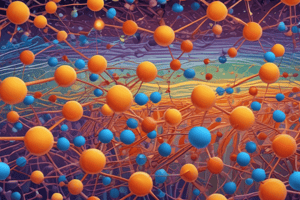Podcast
Questions and Answers
What is the most important steroid among lipids?
What is the most important steroid among lipids?
- Beeswax
- Paraffin wax
- Cholesterol (correct)
- Plant wax
What is the monomer of nucleic acids?
What is the monomer of nucleic acids?
- Fatty acids
- Amino acids
- Waxes
- Nucleotide (correct)
Which type of fatty acid has more than one double bond?
Which type of fatty acid has more than one double bond?
- Monounsaturated fatty acids
- Unsaturated fatty acids (correct)
- Trans fatty acids
- Saturated fatty acids
What are lipids relatively insoluble in, but soluble in organic solvents?
What are lipids relatively insoluble in, but soluble in organic solvents?
What do carbohydrates consist of?
What do carbohydrates consist of?
Which of the following is NOT a function of carbohydrates?
Which of the following is NOT a function of carbohydrates?
What type of polymer makes up the cell walls of fungi?
What type of polymer makes up the cell walls of fungi?
Which of the following is true about muscle tissues?
Which of the following is true about muscle tissues?
What is the role of essential amino acids in the body?
What is the role of essential amino acids in the body?
Which of the following is NOT a common monosaccharide?
Which of the following is NOT a common monosaccharide?
What is the function of enzymes in the body related to carbohydrates?
What is the function of enzymes in the body related to carbohydrates?
Flashcards are hidden until you start studying
Study Notes
- Lipids play various roles in the body, including acting as a long-term energy storage, forming cell membranes, and serving as chemical messengers.
- The main components of lipids are triglycerides, phospholipids, and steroids, with most lipids containing glycerol and fatty acids that are hydrophobic and do not dissolve in water.
- Steroids are a class of lipids made up of fused rings of atoms, with cholesterol being the most important steroid.
- Nucleic acids are molecules that contain genetic information in the form of DNA or RNA, consisting of nucleotides that transmit genetic information to the next generation.
- Proteins are polymers of amino acids and serve various functions in the body, such as providing structural support, acting as enzymes, and playing a role in immune responses.
Studying That Suits You
Use AI to generate personalized quizzes and flashcards to suit your learning preferences.



